六年级英语上册Unit 4第四单元知识盘点
人教版英语六年级上册第四单元单词
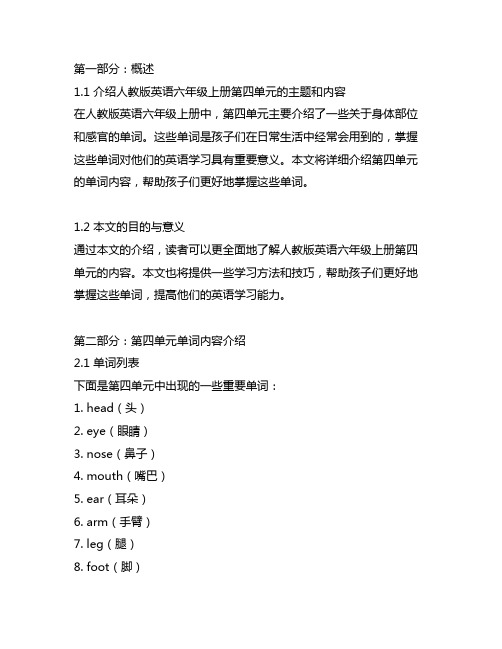
第一部分:概述1.1 介绍人教版英语六年级上册第四单元的主题和内容在人教版英语六年级上册中,第四单元主要介绍了一些关于身体部位和感官的单词。
这些单词是孩子们在日常生活中经常会用到的,掌握这些单词对他们的英语学习具有重要意义。
本文将详细介绍第四单元的单词内容,帮助孩子们更好地掌握这些单词。
1.2 本文的目的与意义通过本文的介绍,读者可以更全面地了解人教版英语六年级上册第四单元的内容。
本文也将提供一些学习方法和技巧,帮助孩子们更好地掌握这些单词,提高他们的英语学习能力。
第二部分:第四单元单词内容介绍2.1 单词列表下面是第四单元中出现的一些重要单词:1. head(头)2. eye(眼睛)3. nose(鼻子)4. mouth(嘴巴)5. ear(耳朵)6. arm(手臂)7. leg(腿)8. foot(脚)2.2 单词意义和用法head(头)是人体的一部分,用于容纳大脑和其他主要感觉器官。
eye(眼睛)、nose(鼻子)、mouth(嘴巴)和ear(耳朵)是人体的感官器官,分别用于观察、嗅觉、口腔感觉和听觉。
arm(手臂)、leg(腿)和foot(脚)是人体的运动器官,用于进行各种日常活动。
第三部分:学习方法与技巧3.1 记忆方法通过与伙伴或家人一起练习,可以加深对这些单词的印象。
你可以让家人或朋友给你做一个小测验,让他们用英语命令你摸哪个部位。
这样不仅可以帮助你记忆单词,还可以增进你和家人朋友之间的交流。
3.2 语境运用在日常生活中,可以通过观察自己和他人的身体部位来运用这些单词。
当你看到父母帮助你妹妹擦嘴巴时,你可以用英语说:“Mom is wiping her mouth for my sister.”这样可以提高语境运用的能力,使单词更加活学活用。
第四部分:总结本文通过介绍人教版英语六年级上册第四单元的单词内容,并提供了一些学习方法和技巧,希望能够帮助孩子们更好地掌握这些单词。
通过不断地练习和运用,相信孩子们一定能够轻松地掌握这些单词,提高他们的英语水平。
人教版六年级英语上册Unit 4 第四单元知识总结

Unit4I have a pen pal一、核心词汇1. 名词: puzzle谜hiking远足2. 动词: studies(study的第三人称单数形式)学习二、了解词汇1. 名词: hobby业余爱好jasmine茉莉idea想法;主意Canberra 堪培拉(澳大利亚首都)goal射门club俱乐部2. 动词: shall表示征求意见join加入share分享3. 形容词: amazing令人惊奇的4. 短语: pen pal笔友三、核心句型1. — What are his hobbies?他有什么爱好?— He likes flying kites and singing English songs. 他喜欢放风筝和唱英文歌。
举一反三: What are your hobbies?你有什么爱好?What are her hobbies?她有什么爱好?拓展句型: — What is his/her hobby? 他/她有什么爱好?— He/She likes+动名词+其他. 他/她喜欢……拓展:动名词的构成方式(1)一般在动词后面加-inggo — going ask — asking do — doing(2)以不发音字母e 结尾的去e加-ingwrite — writing take — taking have — having(3)以重读闭音节结尾的词,末尾只有一个辅音字母,双写末尾辅音字母,再加-ing stop — stopping shop — shopping plan — planning2. — Does he live in Sydney?他住在悉尼吗?— No, he doesn’t. 不,他没有。
注意:在一般疑问句和否定句中动词第三人称单数要变回原形。
四、了解句型1. Why not? 为什么不能呢?解读: why not 后还可接动词原形,用来询问“为什么不……”, why don’t you也意为“为什么不”。
精通版六年级英语上册 Unit 4 January is the first month 知识点清单

Unit 4 January is the first month.一、核心词汇1. 描述节日的词组Mother’s Day母亲节Children’s Day儿童节Father’s Day 父亲节2. 描述月份的词汇January一月February二月March三月April四月May五月June六月3. 其他tree树; 树木grass草; 草地stop(使) 停止egg蛋; 卵back回原处; 后面their他(她、它)们的二、拓展词组1. 描述属于一年里的第几个月的词组the first month of the year一年里的第一个月the second month of the year一年里的第二个月the third month of the year一年里的第三个月the fourth month of the year一年里的第四个月the fifth month of the year一年里的第五个月the sixth month of the year一年里的第六个月2. 描述节日的词汇或词组New Year’s Day元旦Spring Festival春节Tree Planting Day植树节Easter复活节Labour Day劳动节三、核心句型1. There are twelve months in a year.一年有十二个月。
解读:这是描述某地/物有某物的句子。
举一反三:There is a desk and two chairs in the room. 房间里有一张书桌和两把椅子。
2. January is the first month.一月是第一个月。
解读:这是一个描述某月是第几个月的句子。
举一反三:February is the second month. 二月是第二个月。
3. The first day, January 1st, is called New Year’s Day.第一天, 1月1日, 被叫作元旦。
人教版小学英语六年级上册第四单元知识点

人教版小学英语六年级上册第四单元知识点集团文件版本号:(M928-T898-M248-WU2669-I2896-DQ586-M1988)UNIT4 I have a pen pal一.单词Hobby ['h?bi] 爱好ride a bike--riding a bike骑自行车dive—diving 跳水play the violin— playing the violin[,vai?'lin] 拉小提琴make kites—making kites制作风筝collect[k?'lekt] stamps[st?mp]—collecting stamps 集邮fun 快乐;乐趣with 同…live –lives 居住teach—teaches 教go—goes 去watch—watches 看read—reads 读,看does doesn’t=does not二.重点短语Go swimming 去游泳 ride a bike 骑自行车Listen to music 听音乐 collect stamps 搜集邮票Watch TV 看电视 make kites 做风筝Play chess 下棋 draw pictures 画画Play football 踢足球 look the same 看起来一样Play the violin 拉小提琴 write emails 写邮件Go to work 去上班 read newspapers 读报纸Go home 回家 go to bed 上床睡觉三重点句型What’s your hobby?你的兴趣/爱好是什么?What about you 你呢?What do/does sb like 某人喜欢什么I like sth 我喜欢什么Be happy to do sth 高兴干某事三.重点语法1、动词变为动名词的规则:动词变为动名词,即是动词加ing。
译林版英语六年级上册第四单元知识点归纳
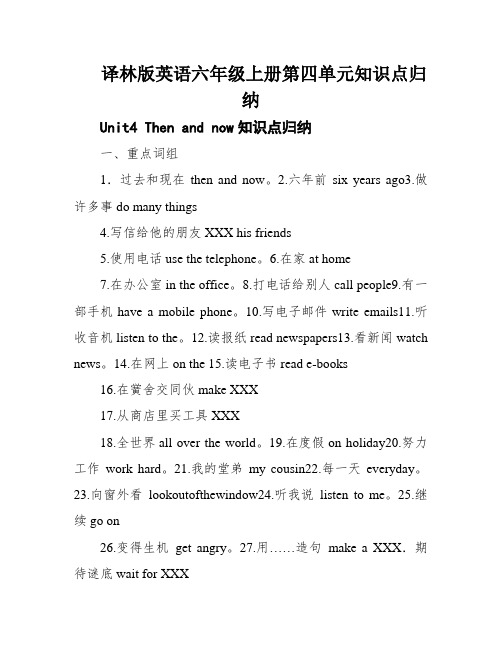
译林版英语六年级上册第四单元知识点归纳Unit4 Then and now知识点归纳一、重点词组1.过去和现在then and now。
2.六年前six years ago3.做许多事do many things4.写信给他的朋友XXX his friends5.使用电话use the telephone。
6.在家at home7.在办公室in the office。
8.打电话给别人call people9.有一部手机have a mobile phone。
10.写电子邮件write emails11.听收音机listen to the。
12.读报纸read newspapers13.看新闻watch news。
14.在网上on the 15.读电子书read e-books16.在黉舍交同伙make XXX17.从商店里买工具XXX18.全世界all over the world。
19.在度假on holiday20.努力工作work hard。
21.我的堂弟my cousin22.每一天everyday。
23.向窗外看lookoutofthewindow24.听我说listen to me。
25.继续go on26.变得生机get angry。
27.用……造句make a XXX.期待谜底wait for XXX二、主要知识点1.本单元出现的一些介词的用法写…给…write…to…使用…做…use…to…听…XXX在网上XXX在XXX从商店里fromshops向窗外看XXX等待waitfor用make a XXX“egg”2.祈使句XXX to the。
否定句Don’t listen to the。
Make a XXX“egg”。
Don’t make a XXX“egg”.Please look out of the window。
Please don’t look out of the window.Sam。
人教版六年级英语上册《Unit4 I have a pen pal》重点难点知识梳理

人教版六年级英语上册《Unit4 I have a pen pal》重点难点知识梳理重点:询问某人爱好的问句及其答语;英语中常用的几种表建议的句型;由do/does引导的一般疑问句。
难点:动词-ing形式的变化规则;复习一般现在时。
【词组】do kung fu 练功夫climb mountains 爬山do word puzzles 猜字listen to music 听音乐go hiking 去远足read stories 读故事fly kites 放风等cook Chinese food 烹饪中国食物draw cartoons 画漫画be interested in 对….感兴pay football 踢足球play sports 进行体育运动play the pipa 弹琵琶【惯用表达式】1. Good idea! 好主意2. Me too! 我也是3. Really? 真的吗?4. Don' t worry. 别担心。
【重点句子与句型】1. 询问某人爱好的问句及其答语问句:What are sb. ' s hobbies?答语:主语+ like /likes+动词-ing形式(+其他)例:-What are Peter' s hobbies? 皮特的爱好是什么? -He likes reading stories. 他喜欢读故事。
2.由do/does引导的一般疑问句及其答语。
问句:Do/Does+主语+动词原形+其他?答语:Yes,主语+do/does./ No, 主语+don't/doesn't 例:-Does he live in Sydney? 他住在悉尼吗-No,he doesn't. 不,他不住在悉尼。
3.询问他人是否喜欢做某事的问句及其答语:问句:Does+主语(第三人称单数)+like+动词-ing形式(+其他)? 答语:Yes, he/she does. , he/she doesn't.例:-Does he like doing word puzzles and going hiking? 他喜欢猜字迷和去远足吗?-Yes,he does.是的,他喜欢。
六年级英语上册 Unit 4 I have a pen pal知识点总结 人教PEP版
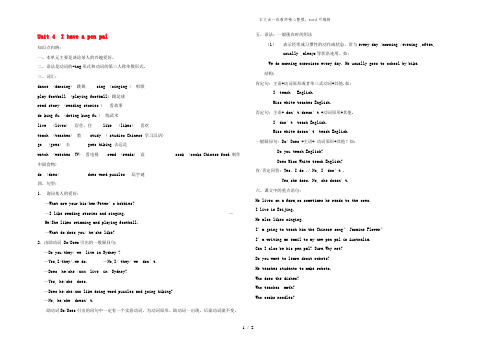
Unit 4 I have a pen pal知识点归纳:一、本单元主要是谈论某人的兴趣爱好。
二、语法是动词的-ing形式和动词的第三人称单数形式。
三、词汇:dance (dancing) 跳舞 sing (singing ) 唱歌play football (playing football) 踢足球read story (reading stories ) 看故事do kung fu (doting kung fu ) 练武术live (lives) 居住,住 like (likes) 喜欢teach (teaches) 教 study ( studies Chinese 学习汉语)go (goes) 去 goes hiking 去远足watch (watches TV) 看电视 read (reads) 读 cook (cooks Chinese food 制作中国食物)do (does) does word puzzles 玩字谜四、句型:1.询问某人的爱好:—What are your/his/her/Peter’s hobbies?—I like reading stories and singing. —He/She likes swimming and playing football.—What do/does you/ he/she like?2. 由助动词 Do/Does引出的一般疑问句:—Do you/they/ we live in Sydney ?—Yes,I/they/.we do. —No,I/ they/ we don’t.—Does he/she /xxx live in Sydney?—Yes, he/she does.—Does he/she/xxx like doing word puzzles and going hiking?—No, he/she doesn’t.助动词Do/Does引出的问句中一定有一个实意动词,为动词原形。
译林版六年级上册英语U4第四单元知识点梳理
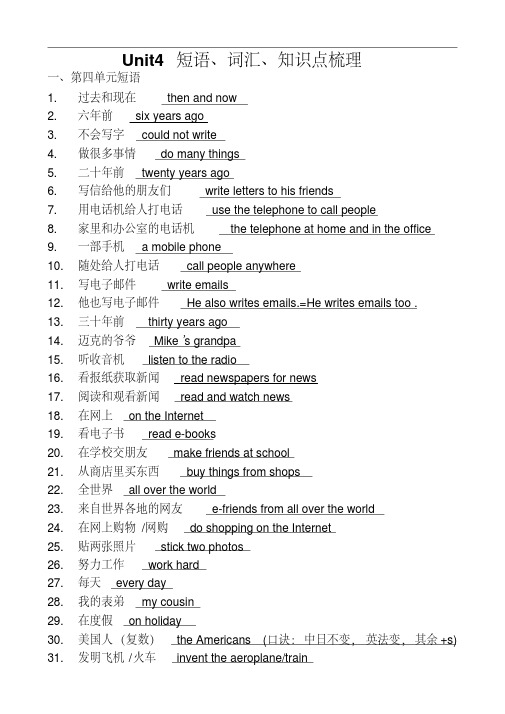
Unit4 短语、词汇、知识点梳理一、第四单元短语1.过去和现在then and now2.六年前six years ago3.不会写字could not write4.做很多事情do many things5.二十年前twenty years ago6.写信给他的朋友们write letters to his friends7.用电话机给人打电话use the telephone to call people8.家里和办公室的电话机the telephone at home and in the office9.一部手机 a mobile phone10.随处给人打电话call people anywhere11.写电子邮件write emails12.他也写电子邮件He also writes emails.=He writes emails too .13.三十年前thirty years ago14.迈克的爷爷Mike’s grandpa15.听收音机listen to the radio16.看报纸获取新闻read newspapers for news17.阅读和观看新闻read and watch news18.在网上on the Internet19.看电子书read e-books20.在学校交朋友make friends at school21.从商店里买东西buy things from shops22.全世界all over the world23.来自世界各地的网友e-friends from all over the world24.在网上购物/网购do shopping on the Internet25.贴两张照片stick two photos26.努力工作work hard27.每天every day28.我的表弟my cousin29.在度假on holiday30.美国人(复数)the Americans (口诀:中日不变,英法变,其余+s)31.发明飞机/火车invent the aeroplane/train32.英国人the British/the Englishmen33.一节英语课an English lesson34.朝窗外看look out of the window35.听我说listen to me36.继续go on37.今天是星期几?What day is today?=What day is it today?38.你会拼写它吗?Can you spell it ?39.变得生气get angry40.用“鸡蛋”造一个句子make a sentence with ‘egg’41.吃一块蛋糕eat a cake42.“鸡蛋”在哪儿?Where’s the ‘egg’?43.等待答案wait for the answer44.复习一般过去时review the simple past tense.45.一岁one year old46.三岁three years old47.贴一张你自己的照片stick a photo of yourself48.比较过去时和现在时/抚今追昔compare the past with the present二、第四单元词汇1.过去和现在then and now2.,,以前ago3.使用use4.电话telephone5.办公室office6.移动电话,手机mobile phone7.随处,到处anywhere8.收音机radio9.报纸(可数名词) newspaper10.新闻(不可数名词) news11.观看watch12.电子书e-book13.交朋友make friends14.全世界all over the world15.购物do shopping16.电视TV17.朝,,外看look out of18.继续go on19.仍然still20.今天是星期几What day is today?21.拼写spell22.造句make a sentence23.用with24.昨天yesterday三、第四单元知识点梳理1、一般过去时情态动词的句型转换:(1)could引导的一般过去时的否定句,在could之后加not:could not=couldn’tSix years ago, I could write.(否定句)Six years ago, I couldn’t write.(2)could引导的一般过去时的一般问句,将could调至句首:Mike could read and draw.(一般问句)Could Mike read or draw?(3)could引导的特殊问句:特殊疑问句+could引导的一般问句:They could ride a bike.(对画线部分提问)Could they ride a bike(用do what替换) ?What could they do ?2、一般过去时和一般现在时的动词形式对比:时间决定时态根据句中时间副词的不同,使用不同的动词形式。
六年级英语Unit4知识点

六年级英语Unit4知识点一、第四单元短语1过去和现在 then and now 2六年前 six years ago3不会写字 could not write 4做很多事情 do many things5二十年前 twenty years ago X|k | B| 1 . c|O |m6写信给他的朋友们 write letters to his friends7用电话机给人打电话 use the telephone to call people8家里和办公室的电话机 the telephone at home and in the office 9一部手机 a mobile phone 10随处给人打电话 call people anywhere11写电子邮件 write emails12他也写电子邮件 He also writes emails.=He writes emails too .13三十年前 thirty years ago 14迈克的爷爷 Mike’s grandpa15听收音机 listen to the radio16看报纸获取新闻 read newspapers for news17阅读和观看新闻 read and watch news 18在网上 on the Internet19看电子书 read e-books 20在学校交朋友 make friends at school21从商店里买东西 buy things from shops22全世界 all over the world23来自世界各地的网友 e-friends from all over the world24在网上购物/网购 do shopping on the Internet25贴两张照片 stick two photos 26努力工作 work hard27每天 every day 28我的表弟 my cousin29在度假 on holiday30美国人(复数) the Americans (口诀:中日不变,英法变,其余+s)31发明飞机/火车 invent the aeroplane/train32英国人 the British/the Englishmen 33一节英语课 an English lesson34朝窗外看 look out of the window 35听我说 listen to me36继续 go on 37你会拼写它吗? Can you spell it ?38今天是星期几? What day is today?=What day is it today?39变得生气 get angry 40吃一块蛋糕 eat a cake41用“鸡蛋”造一个句子 make a sentence with ‘egg’42“鸡蛋”在哪儿? Where’s the ‘egg’ ?43等待答案 wait for the answer 44一岁 one year old二、第四单元知识点梳理1、一般过去时情态动词的句型转换:新课标第一网(1)could引导的一般过去时的否定句,在could之后加not:=couldn’tSix years ago, I couldn’t write.(2)could引导的一般过去时的一般问句,将could调至句首:Could Mike read or draw?(3)could引导的特殊问句:特殊疑问句+could引导的一般问句:What could they do ?2、一般过去时和一般现在时的动词形式对比:时间决定时态3、字母组合er的发音:/ə/。
六年级英语上册重点知识清单Module4(外研版一起)(1)

六年级上学期M4重点学校:班级:姓名:一、重点单词:Thanksgiving感恩节special特殊的nearly差不多,将近poem诗amazing令人惊讶的sure当然December十二月light灯二、重点短语:National Day国庆节a big, special dinner一顿丰盛的特别的晚餐have a lot of fun玩得开心write a poem写一首诗the Spring Festival春节in many countries在许多国家on the 25th of December在十二月二十五日Christmas trees圣诞树give presents赠送礼物send cards寄贺卡the White House白宫favourite festival最喜爱的节日the MidAutumn Festival中秋节the Dragon Boat Festival 端午节the Lantern Festival元宵节country(复数)countrieslove(形容词)lovelysound(三单)soundseat(过去式)ateI(宾格)methey(/宾格)themwe(宾格)usAmerica(形容词)American三、重点句型:1. A: Which festival in the US is your favourite?在美国你最喜欢的节日是哪一个?B:My favorite festival is Thanksgiving .我最喜欢的节日是感恩节。
2. A: What do you do on Thanksgiving Day?感恩节那天你们干什么?B: We always have a big, special dinner. We say “Thank you” for our food, family and通常吃一顿特别的大餐。
PEP英语六年级上册第四单元语法知识点
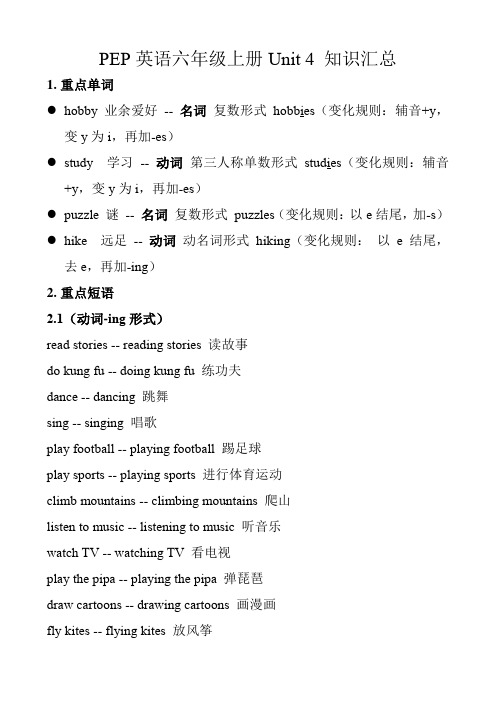
PEP英语六年级上册Unit 4 知识汇总1.重点单词●hobby 业余爱好--名词复数形式hobbies(变化规则:辅音+y,变y为i,再加-es)●study 学习--动词第三人称单数形式studies(变化规则:辅音+y,变y为i,再加-es)●puzzle 谜--名词复数形式puzzles(变化规则:以e结尾,加-s)●hike 远足--动词动名词形式hiking(变化规则:以e结尾,去e,再加-ing)2.重点短语2.1(动词-ing形式)read stories -- reading stories 读故事do kung fu -- doing kung fu 练功夫dance -- dancing 跳舞sing -- singing 唱歌play football -- playing football 踢足球play sports -- playing sports 进行体育运动climb mountains -- climbing mountains 爬山listen to music -- listening to music 听音乐watch TV -- watching TV 看电视play the pipa -- playing the pipa 弹琵琶draw cartoons -- drawing cartoons 画漫画fly kites -- flying kites 放风筝sing English songs -- singing English songs 唱英文歌2.2 重点短语(动词的第三人称单数形式)live -- livesdo -- doesstudy Chinese -- studies Chinescook Chines food -- cooks Chinese fooddo word puzzles -- does word puzzlesgo hiking -- goes hiking3.重点语法知识3.1like的用法like 喜欢(动词原形)likes (第三人称单数形式)like doing... 喜欢做...... (表示动词like后接动词的ing形式)例句:陈述句I like doing kung fu and swimming. 我喜欢练功夫和游泳。
pep小学英语六年级上册第四单元知识点

UNIT4 I have a pen pal一.单词Hobby ['hɔbi] 爱好ride a bike--riding a bike骑自行车dive—diving 跳水play the violin—playing the violin[,vaiə'lin] 拉小提琴make kites—making kites制作风筝collect[kə'lekt] stamps[stæmp]—collecting stamps 集邮fun 快乐;乐趣with 同…live –lives 居住teach—teaches 教go—goes 去watch—watches 看read—reads 读,看does doesn’t=does not二.重点短语Go swimming 去游泳ride a bike 骑自行车Listen to music 听音乐collect stamps 搜集邮票Watch TV 看电视make kites 做风筝Play chess 下棋draw pictures 画画Play football 踢足球look the same 看起来一样Play the violin 拉小提琴write emails 写邮件Go to work 去上班read newspapers 读报纸Go home 回家go to bed 上床睡觉三重点句型What’s your hobby?你的兴趣/爱好是什么?What about you? 你呢?What do/does sb like? 某人喜欢什么I like sth 我喜欢什么Be happy to do sth 高兴干某事三.重点语法1、动词变为动名词的规则:动词变为动名词,即是动词加ing。
一般要遵循以下三条规则:(1)一般情况下,在动词的后面直接加ing。
如:play—playing read—reading do—doing go—going(2)以不发音的字母e结尾的动词,要去掉不发音的字母e,再加ing。
六年级上册英语1-4单元必考知识点总结

Unit 3 What are you going to do?
一.词汇 'next week 下周
newsp叩er 报纸
this morning 今天上午
comic book漫画书
Time: (时间)
this afternoon 今天下午 this evening今天晚上
magazine 杂志 dictionary 字典
make kites (making kites )制作风筝 colLect stamps (collecting stamps)集邮
三单
Live (lives)居住,住 teach (teaches)教 go (goes)去 watch (watches)看 read (reads)读
其他show (展览)
(交通工具前加by,表示乘坐但步行要用on foot)
三会一
fifth第五 difference 不同 country 国家 right右边的 Australia澳大利亚 if如果
remember 记住 same相同的 mean意思是
side 边 however 但是 must必须
find找到 every每个所有的 drive驾驶
do (does) pen pal(笔友)
dear (亲爱的)
look(看上去)fun(快乐,乐趣)
with(同…)
三、重点句型:
1 .询问某人的爱好:
---------- What's your hobby?你的爱好是什么?
-----------1 Like collecting stamps.我喜欢集邮 2 .表示征求别人意见:
我坐飞机去。
■ ----------- How does your father go to work? ----------- He goes to work by subway.
六年级英语上册Unit4重点难点归纳
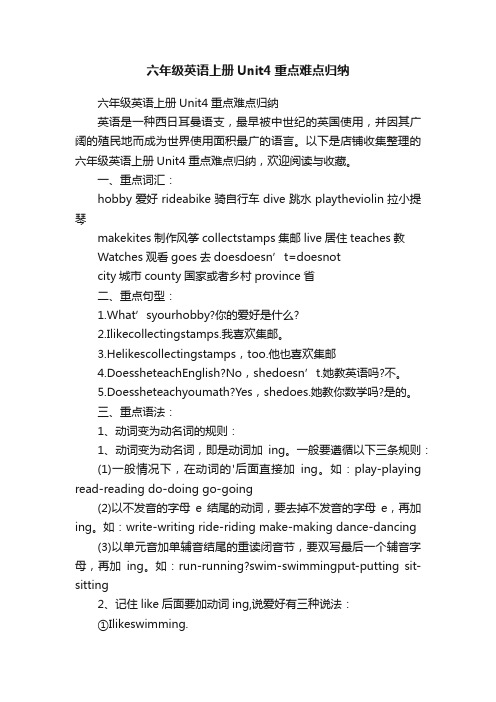
六年级英语上册Unit4重点难点归纳六年级英语上册Unit4重点难点归纳英语是一种西日耳曼语支,最早被中世纪的英国使用,并因其广阔的殖民地而成为世界使用面积最广的语言。
以下是店铺收集整理的六年级英语上册Unit4重点难点归纳,欢迎阅读与收藏。
一、重点词汇:hobby爱好rideabike骑自行车dive跳水playtheviolin拉小提琴makekites制作风筝collectstamps集邮live居住teaches教Watches观看goes去doesdoesn’t=doesnotcity城市county国家或者乡村province省二、重点句型:1.What’syourhobby?你的爱好是什么?2.Ilikecollectingstamps.我喜欢集邮。
3.Helikescollectingstamps,too.他也喜欢集邮4.DoessheteachEnglish?No,shedoesn’t.她教英语吗?不。
5.Doessheteachyoumath?Yes,shedoes.她教你数学吗?是的。
三、重点语法:1、动词变为动名词的规则:1、动词变为动名词,即是动词加ing。
一般要遵循以下三条规则:(1)一般情况下,在动词的'后面直接加ing。
如:play-playing read-reading do-doing go-going(2)以不发音的字母e结尾的动词,要去掉不发音的字母e,再加ing。
如:write-writing ride-riding make-making dance-dancing(3)以单元音加单辅音结尾的重读闭音节,要双写最后一个辅音字母,再加ing。
如:run-running?swim-swimmingput-putting sit-sitting2、记住like后面要加动词ing,说爱好有三种说法:①Ilikeswimming.②Swimmingismyhobby.③Myhobbyisswimming.注意:Shelikesdrawingpictures,listeningtomusicandmakingkites.这几个爱好是并列的,都是在like后面,所以都要加ing.3、第48页是写自己或者笔友的作文模板4、第49页是写自己或者是其他人一天的作文模板,记住要用一般现在时态。
陕旅版六年级上册小学英语 Unit 4 单元知识点小结

Unit 4Let's Go on a Picnic一、核心词汇1. 名词: picnic野餐basket篮子2. 动词: put放need需要ask问;询问start开始;起动answer回答;答复3. 形容词: free空闲的;自由的next下一个hungry饥饿的excited兴奋的;激动的4. 连词: or还是;或者5. 情态动词: shall将要;应该6. 短语: go on a picnic去野餐take out of从……取出put into放入;放进……里面meet at the gate在大门口会合二、拓展词汇1. 名词: park公园kite风筝foot脚;底部idea主意;想法gate门;门口weather天气photo照片2. 动词: go走;去fly飞;放飞get到达 meet会合stand站立;起立give给;给予3. 形容词: far远的early早的fine好的;晴朗的nice美好的;美味的4. 介词: into进;入;到……里in在……里on在……上5. 副词: near在附近6. 短语: watch TV看电视go to the park去公园fly a kite放风筝get to the park到达公园at the foot of在……脚下good idea好主意take a photo照相have a good time过得开心;玩得愉快go shopping购物take a walk散步play ping-pong 打乒乓球play tennis打网球go boating划船go skating滑冰learn English学英语play the violin拉小提琴三、核心句型1. Let's go on a picnic at the foot of the mountains. 让我们去山脚下野餐吧。
解读: 这是表示提出建议, 劝对方一起做某事的句型。
PEP六年级上册英语第4单元知识点
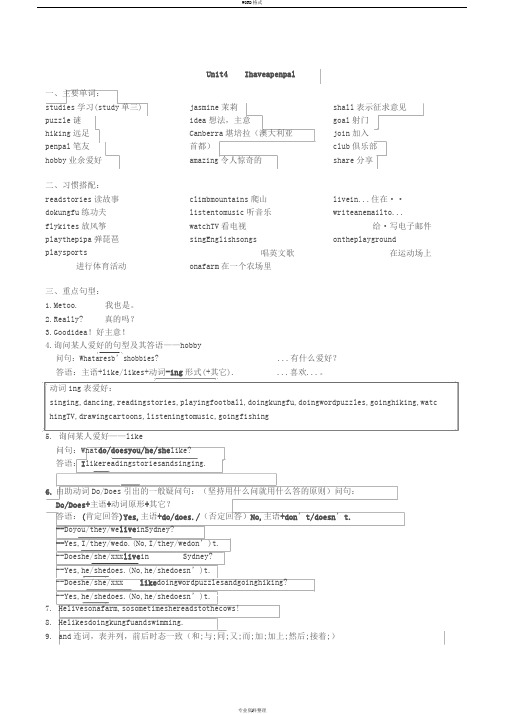
Unit4Ihaveapenpal一、主要单词:studies学习(study单三) jasmine茉莉shall表示征求意见puzzle谜idea想法,主意goal射门hiking远足Canberra堪培拉(澳大利亚join加入penpal笔友首都)club俱乐部hobby业余爱好amazing令人惊奇的share分享二、习惯搭配:readstories读故事climbmountains爬山livein...住在··dokungfu练功夫listentomusic听音乐writeanemailto... flykites放风筝watchTV看电视给·写电子邮件playthepipa弹琵琶singEnglishsongs ontheplayground playsports 唱英文歌在运动场上进行体育活动onafarm在一个农场里三、重点句型:1.Metoo. 我也是。
2.Really? 真的吗?3.Goodidea!好主意!4.询问某人爱好的句型及其答语——hobby问句:Whataresb’shobbies?...有什么爱好?答语:主语+like/likes+动词-ing形式(+其它). ...喜欢...。
动词ing表爱好:singing,dancing,readingstories,playingfootball,doingkungfu,doingwordpuzzles,goinghiking,watc hingTV,drawingcartoons,listeningtomusic,goingfishing5.询问某人爱好——like问句:What do/doesyou/he/she like?答语:I likereadingstoriesandsinging.6.由助动词Do/Does引出的一般疑问句:(坚持用什么问就用什么答的原则)问句:Do/Does+主语+动词原形+其它?答语:(肯定回答)Yes,主语+do/does./(否定回答)No,主语+don’t/doesn’t.--Doyou/they/we live inSydney?--Yes,I/they/wedo.(No,I/they/wedon’)t.--Doeshe/she/xxx live in Sydney?--Yes,he/shedoes.(No,he/shedoesn’)t.--Doeshe/she/xxx like doingwordpuzzlesandgoinghiking?--Yes,he/shedoes.(No,he/shedoesn’)t.7.Helivesonafarm,sosometimeshereadstothecows!8.Helikesdoingkungfuandswimming.9.and连词,表并列,前后时态一致(和;与;同;又;而;加;加上;然后;接着;)10.“也”:too,alsotoo,also区别Heisastudent,too.Heisalsoastudent.1、使用场合不同一般说来,also 用于比较正式(formal)的场合,语气比too庄重;too 是惯熟(familiar )的用语,使用范围较广。
(译林版)六年级英语上册 Unit4 语法知识点

三大时态对比:语法小点:1, can/ could/do/ does/ did +动词原形2, use+事物+to +动词原形使用某物做某事He use d the mobile phone to call people anywhere.3, write + a letter (letters)+ to+人(宾格)write+ 人+ a letter (letters) 给某人写一封信(信)He writes letters to his friends. 他给他的朋友们写信。
4. buy +东西+for+人(宾格)buy +人+东西给某人买某物(buy things 买东西do shopping 购物)5. take +东西+to+人(宾格)take +人+东西6. go/went +动词ing 去做某事go on+动词ing 继续做某事7. listen to me 听我说listen to music 听音乐listen to the radio 听收音机8. Monday(Mon.)星期一Tuesday(Tue.)星期二Wednesday(Wed.) 星期三Thursday(Thur.) 星期四Friday(Fri.)星期五Saturday(Sat.)星期六Sunday(Sun.)星期天9. get/ become(变得) +angry 变得生气10. How old +be动词+主语?人名+be动词+数字(基数)人名+be动词+数字(基数)+years old11. 询问天气:How is the weather? It’s +天气类单词.What is the weather like?作文常用句:It was sunny in the morning. I went to the park with my family. We saw many beautiful flowers. Then, the weather became windy and cloudy. We flew kites high in the sky. In the afternoon, there were black clouds in the sky. It was great fun.I went to Shanghai for the holiday. I visited my aunt. I went to the Bund. I visited the Shanghai Museum. I saw many interesting things.I went fishing. It was great fun. That’s great.This was me six years ago. I could draw and walk. But I couldn’t swim or fly kites. Now I am a student. I can cook and sing. I go to school on foot. I can do many things. I like making friends at school. Do you like me?。
六年级英语上册第四单元知识点梳理译林版

2014六年级英语上册第四单元知识点梳理(译林版)Unit4 短语、词汇、知识点梳理一、第四单元短语1.过去和现在 then and now2.六年前 six years ag不会写字 could not w做很多事情 do many thing二十年前 twenty years ag写信给他的朋友们 write ld用电话机给人打电话 ulall peopl家里和办公室的电话机 the telephone at home and一部手机 a mobil0.随处给人打电话 call people anyw写电子邮件 write email2.他也写电子邮件 He also wails.=He wail三十年前ars ag迈克的爷爷Mi ke’s grandpa听收音机 lad看报纸获取新闻 read newspaw阅读和观看新闻 read and watch new在网上I 看电子书 read e-b20.在学校交朋友 mads at school 21.从商店里买东西 buy thing22.全世界 all over the world23.来自世界各地的网友 e-friends from all over the world24.在网上购物/网购 dgI25.贴两张照片w26.努力工作 work hard27.每天 every day28.我的表弟 my cou29.在度假 on holida0.美国人(复数) the Americans (口诀:中日不变,英法变,其余+s)发明飞机/火车 invaeroplane/tra2.英国人 the British/the Engl一节英语课 an English l朝窗外看look ouwindow听我说 l继续 g今天是星期几? What day is today?=What daday?你会拼写它吗? Can you spell it ?变得生气 get ang0.用“鸡蛋”造一个句子make awith ‘egg’吃一块蛋糕eat a ca2.“鸡蛋”在哪儿?Where’s the ‘egg’ ?等待答案 waansw复习一般过去时 reviewle pa一岁 one year old三岁ars old 贴一张你自己的照片 stick aursel比较过去时和现在时/抚今追昔 compaast w二、第四单元词汇1.过去和现在 then and now2.……以前 ag使用 u电话 tel办公室移动电话,手机 mobil随处,到处 anyw收音机 rad报纸(可数名词) newspa0.新闻(不可数名词) new观看 wa2.电子书 e-b交朋友 mad全世界 all over the world购物 dg电视 TV 朝……外看 look ou继续 g仍然 still20.今天是星期几 What day is today?21.拼写 spell22.造句 make a23.用 w24.昨天 yesterda三、第四单元知识点梳理1、一般过去时情态动词的句型转换:(1)could引导的一般过去时的否定句,在could之后加not:could not=couldn’x years ago, I could write.(否定句)Six years ago, I couldn’t w(2)could引导的一般过去时的一般问句,将could调至句首:uld read and draw.(一般问句)uldad or draw?(3)could引导的特殊问句:特殊疑问句+could引导的一般问句:They could ride a bike.(对画线部分提问)uldde a bike(用do what替换) ?What could they do ?2、一般过去时和一般现在时的动词形式对比:时间决定时态根据句中时间副词的不同,使用不同的动词形式。
